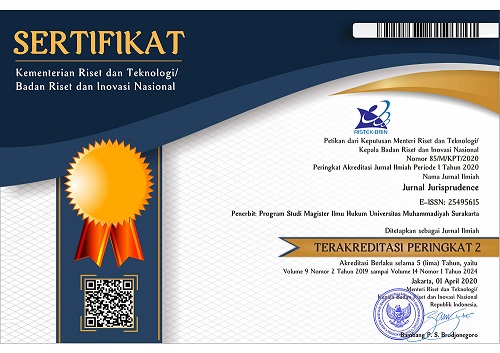Dissenting Opinion on the Constitutionality of Capital Punishment for Narcotics Crime
DOI:
https://doi.org/10.23917/jurisprudence.v13i1.1794Keywords:
Narcotics, Drugs, Capital Punishment, Constitutional Court, Decision, Constitutional, Death Penalty, Narkotika, Narkoba, Hukuman Mati, Pengadilan Konstitusional, Putusan, KonstitusionalAbstract
ABSTRACT
Purpose of the study: This paper aimed to answer the issues of the judicial analysis of cases No. 2 and 3/PUU-V/2007 and the reasons the judge assembly chose to present dissenting opinions.
Methodology: This research employed the normative juridical method. It applied literary materials as well as the literary and statute approaches. The statute approach functioned to analyze regulations that became the judges' consideration sources.
Results: The Constitutional Court assessed whether the crime of narcotics punishable by death is the most serious crime. According to the Constitutional Court, the phrase “the most serious crimes” must also be recited with the phrase “according to the law that is applicable during the occurrence of that crime.” The Constitutional Court assessed that at the national level, the law applicable at that time was the Law on Narcotics. Then, at the international level, Indonesia ratified the International Convention on Narcotics and Psychotropics in 1997. The Constitutional Court argued that capital punishment was constitutional based on Article 28J Paragraph (2) of the 1945 Constitution stating that, “In exercising his/her rights and freedoms, every person shall have the duty to accept the restrictions established by law for the sole purposes of guaranteeing the recognition and respect of the rights and freedoms of others and of satisfying just demands based upon considerations of morality, religious values, security and public order in a democratic society.”
Applications of this study: Society and the government can use this research's results to understand why the death penalty is constitutional in Indonesia. It will motivate both parties to avoid committing crimes, particularly the serious ones.
Novelty/Originality of this study: This writing proves how capital punishment is constitutional in the Indonesian legal system.
Keywords: Narcotics, Drugs, Capital Punishment, Constitutional Court, Decision, Constitutional, Death Penalty.
ABSTRAK
Tujuan: Tulisan ini bertujuan untuk menjawab persoalan analisis hukum perkara No. 2 dan 3/PUU-V/2007 serta alasan mengapa majelis hakim mengajukan pendapat berbeda.
Metodologi: Penelitian ini mengaplikasikan metode yuridis normatif. Peneliti mengguakan bahan-bahan kepustakaan serta pendekatan pustaka dan undang-undang. Pendekatan undang-undang bertujuan untuk menganalisis peraturan yang menjadi sumber pertimbangan hakim.
Temuan: Mahkamah Konstitusi mengevaluasi apakah tindak pidana narkotika yang diancam dengan hukuman mati merupakan tindak pidana yang paling berat. Menurut Mahkamah Konstitusi, kata “kejahatan yang paling berat” juga harus diartikan bersama dengan kata “menurut hukum yang berlaku selama terjadinya kejahatan tersebut”. Mahkamah Konstitusi menilai bahwa hukum yang berlaku secara nasional adalah UU Narkotika. Sedangkan di tingkat internasional, Indonesia mengesahkan Konvensi Internasional Narkotika dan Psikotropika pada tahun 1997. Mahkamah Konstitusi berpendapat bahwa pidana mati bersifat konstitusional berdasarkan Pasal 28J Ayat (2) UUD 1945 yang berbunyi, “Dalam menjalankan hak dan kebebasannya,setiap orang wajib tunduk kepada pembatasan yang ditetapkan dengan undang-undang dengan maksud untuk menjamin pengakuan serta penghormatan atas hak kebebasan orang lain dan untuk memenuhi tuntutan yang adil sesuai dengan pertimbangan moral, nilai-nilai agama, keamanan, dan ketertiban umum dalam suatu masyarakat demokratis.”
Kegunaan: Masyarakat dan pemerintah dapat mengaplikasikan hasil penelitian ini agar memahami mengapa hukuman mati bersifat konstitusional di Indonesia. Hal ini akan memotivasi kedua belah pihak untuk menghindari perbuatan kejahatan, terutama kejahatan serius.
Kebaruan/Orisinalitas: Tulisan ini membuktikan bagaimana pidana mati bersifat konstitusional dalam sistem hukum Indonesia.
Kata Kunci: Narkotika, Narkoba, Hukuman Mati, Pengadilan Konstitusional, Putusan, Konstitusional, Hukuman Mati
Downloads
Submitted
Published
Issue
Section
License
Copyright (c) 2023 Jurnal Jurisprudence

This work is licensed under a Creative Commons Attribution 4.0 International License.

















